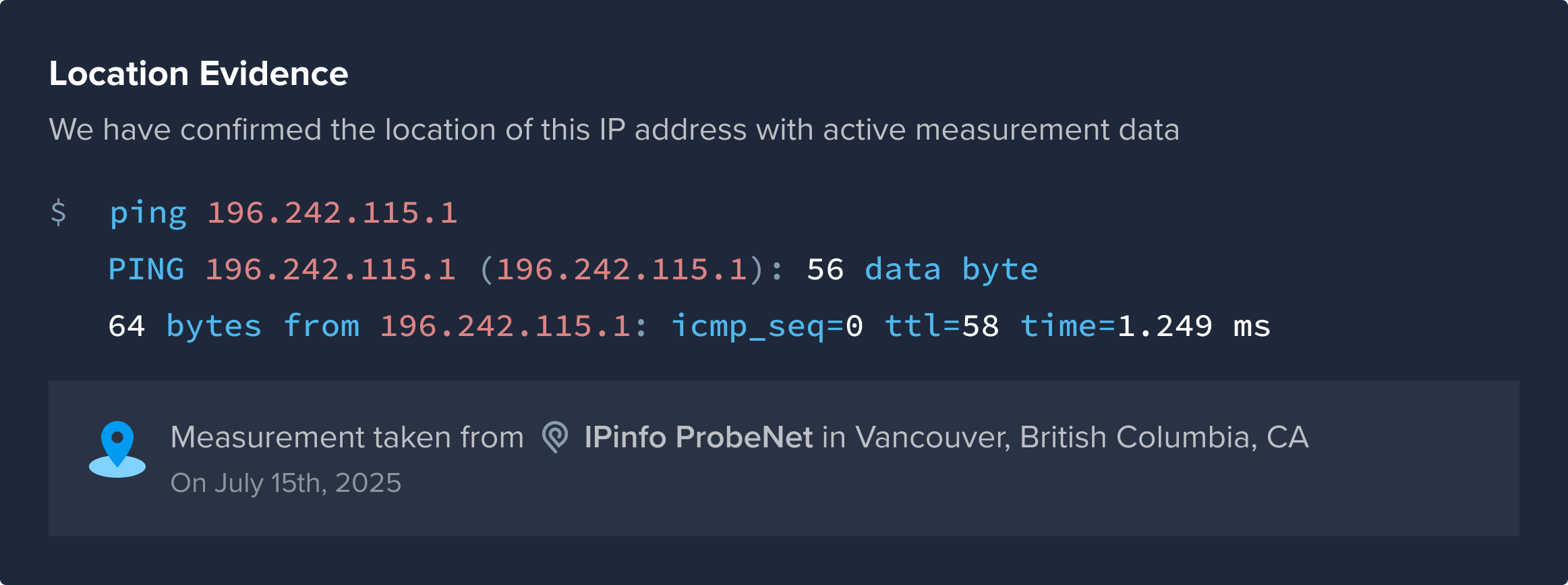Precise Location Data for Every IP Address
The most precise Geolocation API and database for IPv4 and IPv6 — verified data, flexible integration, and trusted accuracy.
Precise Location Context
Get granular details about every IP address with our geolocation data. Using our proprietary internet measurement platform, we reach 44% of the world’s ASNs within 1 millisecond, giving us the most precise location context available.
With fields like location radius, last-seen timestamps, and network type flags, you get the context needed to trust, or challenge, what an IP tells you. These signals support smarter decisions in fraud prevention, compliance, user targeting, and more.
Flexible Access Options
API, database download, and platform integrations—built for any stack, any scale.
Reliable IP Intelligence
Industry-leading precision, daily updates, and trusted accuracy for every IP address.
Built for Developers
Official libraries, clean docs, and powerful APIs designed for real-world deployment.
Built for rapid, accurate development
Sample Response
Dev Notes
Going to be developing with our data? Here's the main things you may want to know:
One-line setup via curl, fetch, or SDK
Multi-language SDKs (Node.js, Python, Go, PHP, Java...)
Real-time JSON, ~100ms average latency
Optional integrations (API, DBs, Snowflake, GCP, Splunk)
Trusted by Microsoft, WordPress, and 1000s of dev team
Fresh, reliable data with 99.99% uptime, updated daily
Fast and Easy API Access
Gain access to our best-in-class data. Setup takes just a few minutes.
- 50-200 ms response time on average
- 99.999% uptime
- Data updates every 24 hours
- Bank grade security
Custom database download
Leverage raw IP datasets, customize your data feeds, and choose your ideal format.
- Customizable fields
- Data updates every 24 hours
- Bank grade security
IPinfo Lite
Powerful IP Data Without Limits. No card required.
Accurate country-level geolocation and ASN details for free. No monthly fees, no credit card required, and unlimited API requests.
Unrivaled data accuracy
Verified IP Accuracy. Not Estimates.
Most IP providers stop at noisy Whois and geofeeds. IPinfo goes further. We don’t just collect IP data — we verify it, validate it, and engineer it for developers.
They guess. We measure. And that makes all the difference.
Step 1: Collect & Clean
Like most IP data companies, we aggregate raw IP data from multiple sources as a starting point.
Step 2: Learn
Our proprietary algorithms then score and filter 20TB+ of IP data daily to measure accuracy and confidence.
Step 3: ProbeNet Ground Truth
1000+ live PoP’s map IPs around the world in real time, delivering unmatched ground-truth accuracy.
Step 4: Validate
A custom hint engine runs 400B+ weekly checks to verify and confirm every signal for total accuracy.
Step 5: Continual Updates
IP’s change continually… so our data refreshes daily to keep every lookup accurate, stable, and production-ready.


How People Use Geolocation Data
Geolocation data powers everything from user experience personalization to fraud prevention With accurate IP-based location signals, teams can make smarter decisions, faster—no GPS or cookies required. Here's how top companies put IPinfo's geolocation to work:
Content Localization
Serve language, pricing, and offers based on a visitor’s country or city without necessitating a login. Geolocation helps tailor experiences at the edge, improving targeting and engagement.
Fraud & Risk Detection
Flag suspicious logins, transactions, or API traffic by detecting impossible travel. Location data is a foundational signal for fraud models that need to detect risk without false positives.
Compliance & Access Control
Enforce geo-based restrictions and content licensing policies by identifying where users are coming from. Geolocation data helps meet regulatory requirements while ensuring a smooth user experience.
Made for Developers, Trusted by Enterprises
Our expert in-house team diligently maintains and supports our IP Geolocation, ensuring you always have accurate, up-to-date IP data at your fingertips. With libraries for more than a dozen popular programming languages—from Ruby to Rust and PHP to Perl—integrating our API is quick and seamless. Explore our developer docs to see just how easy it is to get started.
















Why Choose IPinfo for Location Data
Accurate location data starts with reliable infrastructure. IPinfo’s ProbeNet our proprietary internet measurement platform, captures real-time IP activity from more than 1,000 points of presence, powering city-to-country precision you can trust. Whether you need high-confidence geolocation for compliance, threat detection, or content delivery, we deliver IP data with accuracy that we can prove.
Why Do Geolocation Services Matter
Location signals shape how apps personalize content, detect fraud, and meet regulatory obligations. IP geolocation is often your first, and sometimes only, chance to infer where a request is coming from. But accuracy varies wildly. That’s why choosing a trustworthy, transparent provider is critical for making location-based decisions with confidence.
Custom IP Data Solutions for Your Enterprise
Need more than a million monthly requests or specialized IP data? Our Enterprise team is here to help. We’ll tailor a plan to your exact needs—whether you require custom data fields, an OEM relationship, database downloads or dedicated support.
- High-Volume API Requests
- Bespoke Data Combinations
- OEM Partnerships
- Database Downloads
Further Reading
View allFrequently Asked Questions
IP geolocation estimates an internet connected device's general physical location based on its IP address. Geolocation data is based on public registries, routing information, and measurement infrastructure to determine the country, region, and/or city from which an IP originates. Unlike GPS, it doesn't pinpoint a device's exact location on a map, but provides a reasonable approximation, often accurate to the city level. IP location data is commonly used in IP geo-targeting, which delivers content based on a device's location. Geolocation data is also valuable for fraud detection and regulatory compliance.
IP to location services work by analyzing routing patterns, publicly available registry data, and real-world active network measurements to link an IP address with a geographic area Some tools rely on static databases to inform their geolocation data, resulting in more inaccuracies. IPinfo uses a proprietary internet measurement platform to refine accuracy. The result is an estimated location that's useful for detecting regions, enforcing geo-restrictions, or enriching analytics with country or city-level insights.
IP geolocation accuracy varies widely depending on the provider and the methods used to collect data. Some services rely on WHOIS records, traceroutes, crawling, or geofeeds to improve quality, but still face slow updates and incomplete coverage. After discovering the limitations of existing datasets, IPinfo built ProbeNet our internet measurement platform, to actively measure IP infrastructure in real time. This approach delivers city-level IP accuracy that businesses can trust for compliance, fraud detection, and location-based logic.
Several technical and data-driven factors affect IP geolocation accuracy Proxies and VPNs can obscure real locations, and mobile or dynamic IP addresses often change frequently or route through centralized hubs. The type of geolocation service also matters: some rely on third-party databases that may be outdated or imprecise. Others incorporate WHOIS data, traceroutes, crawling, and geofeeds, but these sources vary in freshness and detail. IPinfo improves on these data sources by operating ProbeNet our internet measurement platform, which collects live measurements across the internet. This approach reduces blind spots and ensures location estimates are consistently refreshed, refined, and verified.
No, IP address geolocation does not uniquely identify individuals. It reflects network-level origins like devices in homes, businesses, or VPN endpoints. While city- and country-level location data can inform regional decisions, it's not personally identifiable information (PII) on its own. Ethical geolocation is designed to respect privacy boundaries while still delivering useful context.
Yes, rural and remote locations present unique geolocation challenges. In these areas, internet service providers often route traffic through centralized infrastructure in nearby cities, which can misrepresent the IP's true origin. Data scarcity also plays a role: fewer measurements, less frequent updates, and limited ISP transparency all contribute to reduced precision. Services that rely solely on static databases struggle the most. More accurate providers use real-time probing and corrections to close this gap, but rural accuracy is still inherently lower than urban areas.
Some IP data providers that provide geolocation data also offer privacy detection data that flags IPs associated with VPNs, proxies Tor nodes, and hosting infrastructure. This process checks for traffic patterns and metadata linked to known anonymizing services. Some privacy detection services go further by naming the VPN provider. These insights help distinguish real users from cloaked ones, which is critical for fraud scoring, policy enforcement, and secure access control.
The most modern geolocation data providers support IPv6 address lookups just like IPv4. While IPv6 adoption is still growing, accurate geo-targeting for IPv6 is essential for connected televisions and next-generation infrastructure. IPv6 geolocation compatibility depends on how ISPs assign those address blocks, which can vary in granularity. So whether you're running an IPv6 geolocation API or looking up an IPv6 IP address, the location data returned should be as reliable, assuming your data source is up to date.
An IP geolocation API typically returns IP geolocation data fields such as country, region, city, postal code, latitude/longitude, and timezone. More advanced services include ASN (Autonomous System Number) details, privacy indicators (VPN, proxy, Tor), mobile carrier info network type, and location accuracy metrics like radius and last-changed timestamps. These fields help users understand not just where traffic is coming from, but how reliable that location is and what kind of network is involved.
IP geolocation use cases include fraud detection, content localization, regulatory enforcement, access control, and traffic analytics. Developers often integrate IP lookup APIs into sign-up flows, security checks, or adtech platforms. Marketing teams use geolocation to segment audiences and measure campaign reach. Security teams use it to block suspicious regions or require step-up authentication from anonymized IPs. Users can get IPinfo's IP geolocation via real-time API or bulk database depending on their needs.
Yes, IP geolocation can help enforce geographic restrictions tied to regulations like GDPR, CCPA, and frameworks like OneTrust. Knowing where an IP is likely located allows organizations to trigger regional data-handling rules, restrict access to geo-bound content, or log traffic jurisdiction for audits. While not a standalone compliance tool, location data supports consent management, cross-border data flow control, and digital rights enforcement. Leading providers offer enhanced fields like accuracy radius and last-seen timestamps, which strengthen the case for location-based decisions in regulated environments.
Your IP geolocation is the estimated location (with city, region, and country) of your current IP address. You can check it using an IP address lookup tool or IPinfo's What Is My IP page These tools visualize your IP address location based on known routing, registry, and infrastructure data.
High-quality providers update their geolocation datasets daily, capturing changes in IP routing, ownership, and location behavior. Slower update cycles, like monthly or quarterly, can result in stale data that misses travel and recent IP reassignments. If you're wondering how often your IP address changes, the answer depends on your ISP, network type, and device. Dynamic and residential IPs can shift frequently. That's why providers using real-time internet measurement, user corrections, and verified feeds offer a more reliable signal.
Most geolocation providers, including IPinfo, offer both download and API options An API gives you real-time access to geolocation data, ideal for live apps, dashboards, or transactional lookups, and can be accessed directly or integrated into leading cloud platforms like Snowflake Google Cloud Platform and Splunk A downloadable IP geolocation database (in formats like CSV, JSON, or MMDB) is better for offline use or high-throughput processing. Whether you choose database download or API depends on your integration needs, speed requirements, and data volume.
Yes, most IP lookup APIs, including IPinfo's, require an API key to authenticate requests, apply usage limits, and provide service-level guarantees. Here are step-by-step instructions on how to get an IP lookup API key
We process API requests at a level of trillions per year, and attempting to store log metadata at that scale would be nearly impossible. Our API services take a public IP address as an input and return location details to the user. That's the end of the transaction.










